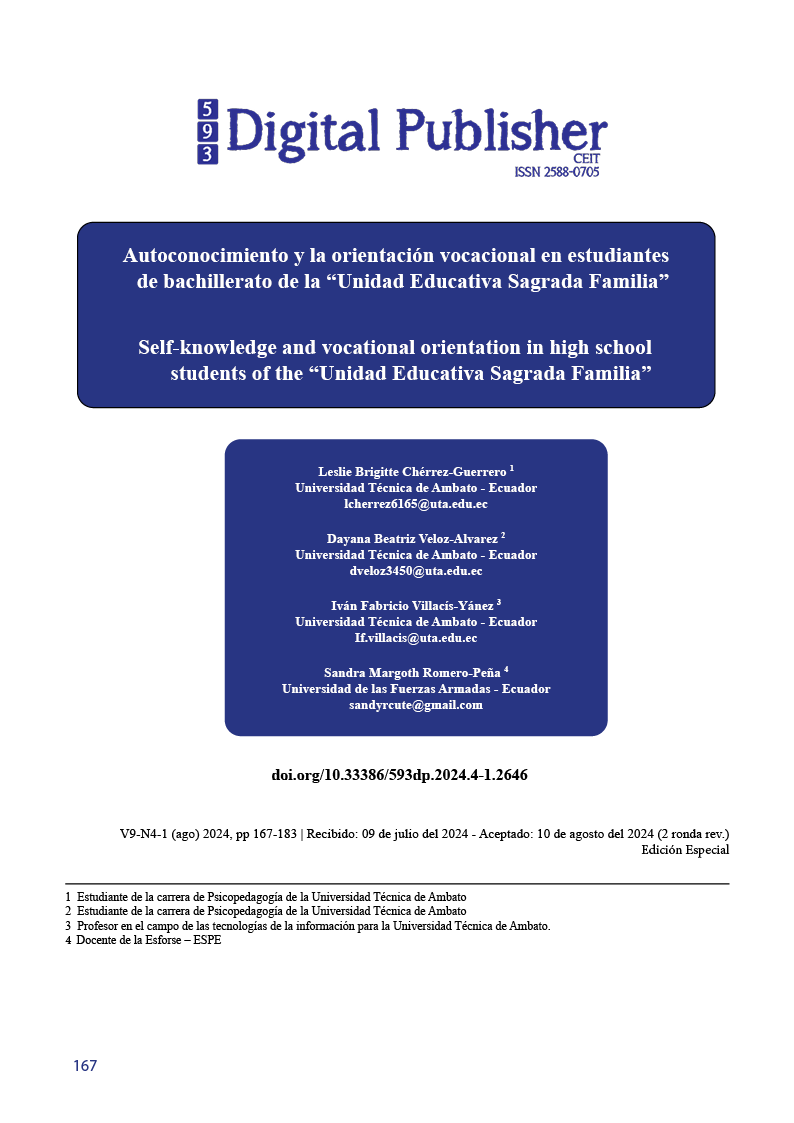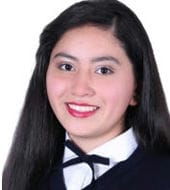Self-knowledge and vocational orientation in high school students of the “Unidad Educativa Sagrada Familia”
Main Article Content
Abstract
The present study examines self-knowledge in high school students of the Unidad Educativa Sagrada Familia de Ambato, Ecuador. Using the AF5 questionnaire, five key dimensions of self-concept were assessed: academic/work, social, emotional, family and physical. The results reveal a complex picture of adolescents' personal development. In the academic/work and social areas, students showed a generally positive perception, suggesting a solid foundation for their professional future. However, the emotional dimension emerged as an area of significant concern, with a high proportion of students reporting difficulties in managing their emotions. The family sphere presented encouraging results, with more than half of the participants expressing satisfaction with their family integration. Regarding physical perception, although mostly positive, opportunities to improve body self-image were identified. These results underscore the need for a holistic approach to career guidance and personal development of high school students. The study proposes that educational strategies go beyond academic performance, addressing emotional, social, and physical development as well. It suggests the implementation of programs that reinforce emotional intelligence skills and promote a healthy self-image, crucial elements for vocational decision making.
Downloads
Article Details

This work is licensed under a Creative Commons Attribution-NonCommercial-ShareAlike 4.0 International License.
1. Derechos de autor
Las obras que se publican en 593 Digital Publisher CEIT están sujetas a los siguientes términos:
1.1. 593 Digital Publisher CEIT, conserva los derechos patrimoniales (copyright) de las obras publicadas, favorece y permite la reutilización de las mismas bajo la licencia Licencia Creative Commons 4.0 de Reconocimiento-NoComercial-CompartirIgual 4.0, por lo cual se pueden copiar, usar, difundir, transmitir y exponer públicamente, siempre que:
1.1.a. Se cite la autoría y fuente original de su publicación (revista, editorial, URL).
1.1.b. No se usen para fines comerciales u onerosos.
1.1.c. Se mencione la existencia y especificaciones de esta licencia de uso.
References
Antonio-Agirre, I., Axpe, I., & Septien, A. (2019). La influencia del estatus socioeconómico y cultural en la relación entre el autoconcepto y la inteligencia emocional percibida en la adolescencia. European Journal of Education and Psychology. https://doi.org/ https://doi.org/10.30552/ejep.v13i1.291
Buckingham, L. R., & Iwaniec, J. (03 de Noviembre de 2023). Self-concept and self-visions in CLIL and non-CLIL learners and their effect on motivation. Wiley: https://doi.org/10.1111/ijal.12518
Buitrago, R., & Sáenz, N. (2021). Autoimagen, Autoconcepto y Autoestima, Perspectivas Emocionales para el Contexto Escolar. Educación y Ciencia. https://doi.org/https://doi.org/10.19053/0120-7105.eyc.2021.25.e12759
Cárcamo, C., Moreno, A., & Del Barrio, C. (2020). Diferencias de género en matemáticas y lengua: rendimiento académico, autoconcepto y expectativas. Scielo. https://doi.org/https://doi.org/10.14349/sumapsi.2020.v27.n1.4
Castro, R., Vargas, E., & García, J. (2021). El autoconcepto del adolescente, su relación con la comunicación familiar y la violencia escolar. Scielo. https://doi.org/https://doi.org/10.46377/dilemas.v8i.2570
Condori, F. (2023). Relevancia de la orientación profesional. Scielo. https://doi.org/https://doi.org/10.53287/jhdt6474qo36t
Erazo, X., & Rosero, E. (2022). Orientación vocacional y su influencia en la deserción universitaria. Revista De Investigación En Ciencias De La Educación. https://doi.org/https://doi.org/10.33996/revistahorizontes.v5i18.198
Esnaola, I., Rodríguez, A., & Goñi, E. (2011). Propiedades psicométricas del cuestionario de Autoconcepto AF5. Annals of Psychology. https://doi.org/https://doi.org/10.6018/analesps
Galvez-Nieto, J. L., Polanco, K., & Salvo, S. (25 de Noviembre de 2016). Propiedades Psicometricas de la Escala de Autoconcepto Academico (EAA) en Estudiantes Chilenos. Revista Iberoamericana de diganóstico y Evaluación-e Avaliacao Psicologica: https://doi.org/10.21865/RIDEP43_5
García, F., & Musitu, G. (2014). AF-5 (Cuarta ed.). Madrid , España: TEA Ediciones. https://web.teaediciones.com/ejemplos/af-5_manual_2014_extracto.pdf
García, F., & Musitu, G. (2023). AF5 Autoconcepto Forma 5. Madrid, España: TEA ediciones, S.A.U. https://doi.org/https://web.teaediciones.com/Ejemplos/AF-5-EXTRACTOWEB.pdf
Guamán-Jiménez, L. X., Bravo-Navarro, W. H., & Rodríguez-Zárate, N. M. (15 de Marzo de 2023). Autoconcepto físico e intención de ser físicamente activos en atletas prejuveniles y juveniles. Revista Multidisciplinaria Arbitrada de Investigación Científica: https://doi.org/10.56048/MQR20225.7.1.2023.3150-3167
Hederich, C., De la Portilla, S., & Montoya, D. (2022). Características psicométricas de la escala de autoconcepto AF5 en estudiantes universitarios de la ciudad de Manizales. https://doi.org/https://doi.org/10.21500/19002386.5517
Mamani-Ramos, A., Damian-Nuñez, E., Torres-Cruz, F., Fiestas-Flores, R., Quisocala-Ramos, J., Mamani-Cari, Y., . . . Escarza-Maica, H. (2023). Las actitudes y autoconcepto físico como condicionantes de la práctica de actividad física. Cuadernos de Psicología del Deporte. https://doi.org/https://doi.org/10.6018/cpd.524721
Martinez Martinez, A., Zurita Ortega, F., Chacon Cuberos, R., Espejo Garces, T., Castro Sanchez, M., & Perez Cortes, A. J. (13 de Enero de 2017). Análisis Psicométrico y Adaptación del Test de Autoconcepto Forma 5 en Universitarios Asiduos al Uso de Videojuegos. Cambridge University Press: https://doi.org/10.21865/RIDEP49.4.06
Medina, P. (29 de Noviembre de 2020). La inteligencia emocional y su relación con el apoyo social y el autoconcepto como factores que influyen en el rendimiento académico de estudiantes de los niveles primario, secundario y superior. Revista Científica Arbitrada de la Fundación MenteClara: https://doi.org/10.32351/rca.v5.203
Nocito, G., Sastre, S., Gratacós, G., & López, E. (2022). “Conoce el atractivo de la profesión docente”: Impacto de un programa de orientación profesional dirigido a estudiantes de Bachillerato. Revista de Investigación Educativa. https://doi.org/https://doi.org/10.6018/rie.450451
Orejarena Silva, H. A., & Alvarino Cadena, E. J. (03 de Mayo de 2021). Efectos del proyecto de vida en el autoconcepto, autoestima y orientación universitaria en estudiantes rurales. Praxis Pedagógica: https://doi.org/10.26620/uniminuto.praxis.21.31.2021.81-95
Perales, C. (2021). Aportaciones sobre el autoconcepto y autoestima. Nunca es tarde para aceptarse. Scielo. https://doi.org/https://doi.org/10.46377/dilemas.v8i.2823
Portillo Peñuelas, S. A., & Reynoso González, O. U. (30 de Octubre de 2020). Autoconcepto, ajuste escolar e inteligencia emocional en estudiantes mexicanos de bachillerato en línea. Publicaciones: https://doi.org/10.30827/publicaciones.v51i1.16445
Puch, F. (2020). Programa educativo de orientación vocacional profesiográfica para estudiantes de 5.º y 6.º de secundaria. Revista Ecuatoriana de Psicología . https://doi.org/https://doi.org/10.33996/repsi.v3i7.41
Quintero, K. (2020). Importancia del Autoconcepto para la Construcción del Conocimiento. Revista Scientific. https://doi.org/https://doi.org/10.29394/Scientific.issn.2542-2987.2020.5.16.17.319-333
Rebolledo, M., Tirado, M., Mahecha, D., & ., V. J. (2021). Incidencia del autoconcepto en el rendimiento académico de los estudiantes de educación secundaria. . Encuentros. https://doi.org/https://doi.org/10.15665/encuen.v19i01.2407
Rodriguez, E. (2024). Carolinos en acción . IDICAP PACÍFICO . https://doi.org/https://doi.org/10.53595/eip.014.2024
Sánchez-Zafra, M., Cachón-Zagalaz, J., Sanabrias-Moreno, D., Lara-Sánchez, A. J., & Shmatkov. (2022). INTELIGENCIA EMOCIONAL, AUTOCONCEPTO Y PRÁCTICA DE ACTIVIDAD FÍSICA EN ESTUDIANTES UNIVERSITARIOS. Journal Sport and Health Research. https://doi.org/ https://doi.org/10.58727/jshr.90752
Santoya, Y., Garcés, M., & Tezón, M. (2018). Las emociones en la vida universitaria: análisis de la relación entre autoconocimiento emocional y autorregulación emocional en adolescentes y jóvenes universitarios. Scielo. https://doi.org/https://doi.org/10.17081/psico.21.40.3081
Sevilla-Santo, D., Martín-Pavón, M., Sunza-Chan, S., & Druet-Domínguez, N. (2021). Autoconcepto, expectativas y sentido de vida: Sinergia que determina el aprendizaje. Scielo. https://doi.org/http://dx.doi.org/10.15359/ree.25-1.12
Velastegui, R., Poler, R., & Madroñero, M. (08 de Julio de 2023). APLICACIÓN DE ALGORITMOS DE APRENDIZAJE AUTOMÁTICO A SISTEMAS ROBÓTICOS MULTIAGENTE PARA LA PROGRAMACIÓN Y CONTROL DE OPERACIONES PRODUCTIVAS Y LOGÍSTICAS: UNA REVISIÓN DE LA LITERATURA RECIENTE. Scopus: https://doi.org/10.37610/dyo.v0i80.643
Yalandá, L., & Trujillo, A. (2021). La importancia de la orientación vocacional en la formación escolar. FEDUMAR. https://doi.org/https://doi.org/10.31948/rev.fedumar8-1.art10




 Professor in the field of Information Technology at the Technical University of Ambato. With over 7 years of experience in the technology sector, specializing in information systems and the development of advanced technological solutions. Additionally, I have worked as a technology consultant for various companies, making significant contributions to the optimization of their computer systems.
Professor in the field of Information Technology at the Technical University of Ambato. With over 7 years of experience in the technology sector, specializing in information systems and the development of advanced technological solutions. Additionally, I have worked as a technology consultant for various companies, making significant contributions to the optimization of their computer systems. 